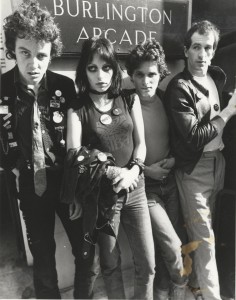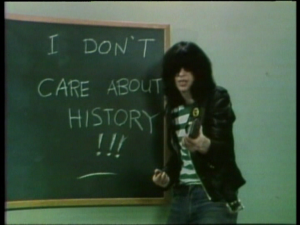You know the rest of the Twenty-Teens will be a hard slog when even the quality of our rebellion is mediocre. Look at the so-called “rebels” in today’s pop culture and what you really see are an endless stream of media frenemies, declaring their disdain for any number of departments while alternately being the exemplars of the same. In every sense, they ridicule the “cool kids” while concurrently emulating them…all “beef” and no balls, some might say. Not that this is such a new occurrence — human beings in general have gotten their “hate on” mostly out of envy, acted out as a duplication of the subject of note, not a departure from it. In terms of being content providers, previous generations at least tried to do it with some style. Their raised middle fingers weren’t crossed. Their anger wasn’t supposed to be empowerment, it was supposed to be anger.
 In the 1970s, in both the U.S. and the U.K. there was plenty to be angry about. Over there, the very real sense of class warfare was on the minds of disaffected youth. The monarchy was stumbling forth while younger generations were excoriated for not falling in line, and for not being one of the “haves.” In the music scene, those divisions were hard to miss. Pop music was alternately becoming softer to cater to the adults who presumably had better taste than you. That which constituted “edgy” was prog rock, with Keith Emerson reconstituting classical pieces as power trio anthems, and Rick Wakeman wearing a purple cape. Pink Floyd had been a holdover from the psychedelic ’60s, and look at how the ’60s turned out.
In the 1970s, in both the U.S. and the U.K. there was plenty to be angry about. Over there, the very real sense of class warfare was on the minds of disaffected youth. The monarchy was stumbling forth while younger generations were excoriated for not falling in line, and for not being one of the “haves.” In the music scene, those divisions were hard to miss. Pop music was alternately becoming softer to cater to the adults who presumably had better taste than you. That which constituted “edgy” was prog rock, with Keith Emerson reconstituting classical pieces as power trio anthems, and Rick Wakeman wearing a purple cape. Pink Floyd had been a holdover from the psychedelic ’60s, and look at how the ’60s turned out.
Love Song – The Damned
Meanwhile, over here, we knew exactly how the ’60s turned out. The wars raged on. We had Nixon and Nixon had us. We had our soft rock too, and it often assumed the role of the dissatisfied Baby Boomers for whom the revolution came and went, with only more of the same to show for it. We also had the drug-fueled dropout music that was disco. In that, the message was “Everything’s fine. Nothing’s wrong. Keep on dancin’.” The youth of the day believed otherwise, but felt powerless to do much about it. Owing to that “revolution lost” feeling, the reaction was a sense of nihilism that fueled the brief era that was punk’s first wave.
To qualify: not all disco was bad. Not all soft rock was a wasted effort. I love a ton of that old soft rock. Not all prog rock was mired in the pomp and ceremony equated to royalty, and I’m completely on record with my appreciation for that as well, but you can imagine that at that period in time it genuinely felt like all prog was was a preamble to some misguided grandeur. So what eventually came of it was the angry, socially separated culture which looked past the current crop to its predecessors. In the U.S., the punks bypassed the psychedelic era and the disco beat, to look to the greasers and the Rockabilly stars of the late ’50s and very early ’60s. The look was black leather jackets, jeans, t-shirts, and an aura of self-ownership. If you listen to the music, past the sheer volume of it, past the lyrics which were arguably designed to be controversial and confrontational, the songs were rock and roll pure and simple. One of the most direct proponents of this idea was Joey Ramone who never denied his love for the Phil Spector groups of old, and much of Ramones look and early output (especially Rock And Roll High School) proudly waved that DNA test in the air. Bee Gees? Jefferson Airplane? You are not the father. Eddie Cochran, you are the father.
Go Mental – Ramones
 On the British Isles, there was a sense of parallelism occurring. Their late-’50s/early-’60s had a variant of the greasers, and they had the Beat Bands like The Beatles. Later on they had music that kept trying to be more serious statements, more self-important, and were considered more pretentious…like The Beatles. Those early Beat Bands took their cues primarily from U.S. soul and R&B, and that distinction was often heard in latter punk groups like The Clash and The Jam. Paul Weller was as unabashed in his love for R&B as Joey Ramone was of that early pop music. But what the U.K. punks had that their international compatriots didn’t have initially was a specific cause for that outrage to be channeled into, and so their music often took on political subject matter and causes.
On the British Isles, there was a sense of parallelism occurring. Their late-’50s/early-’60s had a variant of the greasers, and they had the Beat Bands like The Beatles. Later on they had music that kept trying to be more serious statements, more self-important, and were considered more pretentious…like The Beatles. Those early Beat Bands took their cues primarily from U.S. soul and R&B, and that distinction was often heard in latter punk groups like The Clash and The Jam. Paul Weller was as unabashed in his love for R&B as Joey Ramone was of that early pop music. But what the U.K. punks had that their international compatriots didn’t have initially was a specific cause for that outrage to be channeled into, and so their music often took on political subject matter and causes.
And when it didn’t, in its most overt form, U.K. punk was determined to “take the piss” out of the powers that be. The Sex Pistols might have used the symbolism of anarchy as a fashion statement rather than being actual anarchists, thanks to entrepreneur/provocateur Malcolm McLaren, but the content of their brief and lionized work had a fairly straightforward equation: Polite society is a sort of elitism. The elites don’t like us. They keep us out of work. They don’t want us here because we don’t have upper class bloodlines. Ergo, screw them and their politeness, and anything we can do to shock and upset them is quite alright.
God Save The Queen – The Sex Pistols
Shock was always a key component. Lyrics that played with violent and fascist imagery ranged from The Pistols’ declaration of “I am an antichrist”; Ramones’ inserts of goosestepping, blitzkrieg, and being a long way from Germany; and Fear’s solution to population explosion in the guise of “Let’s Have A War” were not motivated by the desire to create dialogue, but to demand “you will listen to me now, and I want to make you mad.” (Fear, and a large portion of the early-’80s hardcore punk scene were experts in the fine art of shock.) If that sounds unnecessarily rude, consider that has always been the dynamic between the older generation to the younger generation — or, sit down, shut up, and listen to your elders you punk kids — and this was less about flat disrespect than turning the tables.
Psycho Killer – Talking Heads





Comments